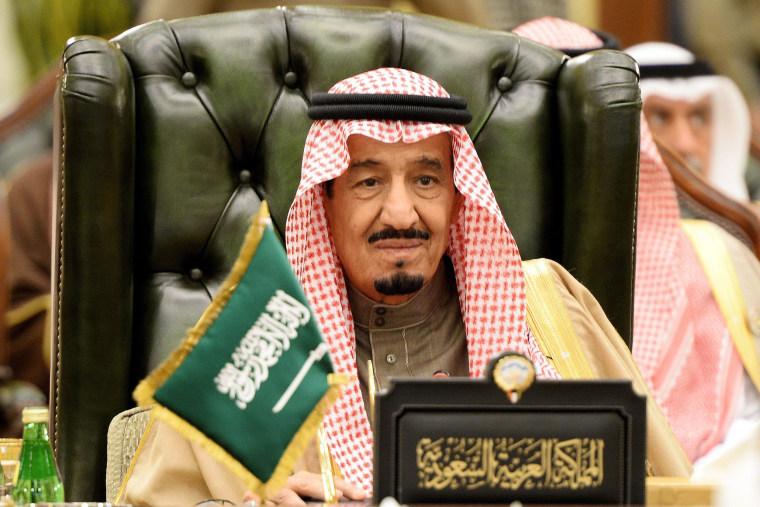Saudi Arabia’s new king is expected to change little in the way the Middle Eastern country and key U.S. ally is governed after the death of King Abdullah — but he is also seen as more cautious on women’s rights than his half-brother.
Salman bin Abdul-Aziz, the late King Abdullah’s half-brother and deputy prime minister until his appointment to the throne, and who for nearly 50 years was governor of Riyadh Province, was named king after Abdullah died of pneumonia at 1 a.m. local time on Friday (5 p.m. ET Thursdsay).
Muqrin bin Abdul-Aziz, who is also a half-brother of Abdullah and is former head of the Saudi intelligence services, was named crown prince.
"It’s entirely possible Salman could be more conservative with regards to women"
"In the last couple of years, the Saudis have been reactive; I don’t think that’s going to change," F. Gregory Gause, professor of international affairs at the Bush School of Government and Public Service at Texas A&M University, told NBC News. "I can’t imagine Salman turning Saudi foreign policy in a significantly different direction."
One place where Salman is seen as differing from Abdullah is with regards to women’s rights. Abdullah in 2011 ordered that women be given the right to vote and to run in municipal elections in 2015, a move that earned him a reputation as a reformer who sought to modernize the country.
"It’s entirely possible Salman could be more conservative with regards to women," Gause said. "I doubt he’ll roll back what’s on the books, but I don’t see a lot of forward progress."
Women still are barred from driving in the conservative country, and must seek the approval of a male "guardian" to work, travel abroad, open a bank account or even undergo surgery in some cases.
"It appeared to me he (the late king) had a good handle on the delicate balancing act he had to do to move society forward while being respectful of its traditions and conservative ways," Robert Jordan, who was U.S. ambassador in Riyadh from 2001 to 2003, told Reuters.
Saudi Arabia has not found a way to counter Shiite Muslim Iran, and the Washington's warming relations with Tehran have put a strain on U.S.-Saudi relations, experts told NBC News.
But Saudi Arabia is a big part of the American-led coalition to combat ISIS, it has aircraft and weaponry that has been called by military experts as good as —if not better than — than the Pentagon's, and it has conducted air strikes against the terror group in Syria. Saudi Arabia has also agreed to allow Americans to train Syrian moderate fighters, part of President Barack Obama’s strategy to defeat ISIS.
"The (Saudi Arabia-Iran) relationship has had a good and long history, but is not what it used to be," Salman Sheikh, the director of the Brookings Doha Center, a center-left think tank, told NBC News this week, adding: "I just wonder how strong relations are between this administration and the Saudi family. This is most crucial period for the next decade."
The new king, Salman, 79, is believed to be in poor health. He and his brothers are part of a group known as the Sudairi Seven, and considered the inner circle of the country’s elite.

In a 2010 interview with Karen Elliot House, author of "On Saudi Arabia: Its People, Past, Religion, Fault Lines," he told her that while Americans are unified by democracy, Saudi Arabia is in essence unified by his family, the Al Sauds.
"'We can't have democracy in Saudi Arabia,' he said, 'because if we did every tribe would be a party and then we would be like Iraq and would have chaos,'" House told The Associated Press.
Meanwhile, President Barack Obama and former President George H. W. Bush both hailed the close relationship between the U.S. and Saudi Arabia in offering their condolences to Abdullah’s family Thursday. Obama said he and Abdullah shared a “genuine and warm friendship.”
"As a leader, he was always candid and had the courage of his convictions. One of those convictions was his steadfast and passionate belief in the importance of the U.S.-Saudi relationship as a force for stability and security in the Middle East and beyond,” Obama said in a statement.
"The closeness and strength of the partnership between our two countries is part of King Abdullah's legacy."
The Associated Press and Reuters contributed to this report.